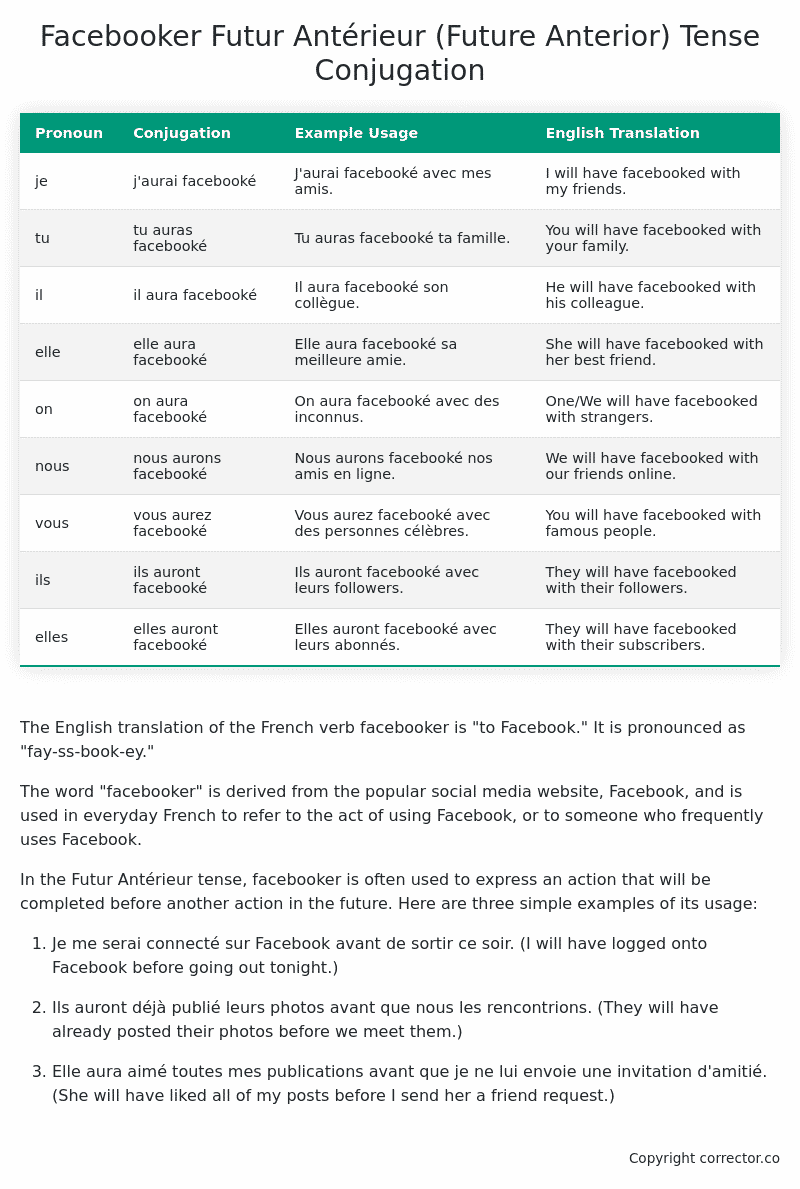Futur Antérieur (Future Anterior) Tense Conjugation of the French Verb facebooker
Introduction to the verb facebooker
The English translation of the French verb facebooker is “to Facebook.” It is pronounced as “fay-ss-book-ey.”
The word “facebooker” is derived from the popular social media website, Facebook, and is used in everyday French to refer to the act of using Facebook, or to someone who frequently uses Facebook.
In the Futur Antérieur tense, facebooker is often used to express an action that will be completed before another action in the future. Here are three simple examples of its usage:
-
Je me serai connecté sur Facebook avant de sortir ce soir. (I will have logged onto Facebook before going out tonight.)
-
Ils auront déjà publié leurs photos avant que nous les rencontrions. (They will have already posted their photos before we meet them.)
-
Elle aura aimé toutes mes publications avant que je ne lui envoie une invitation d’amitié. (She will have liked all of my posts before I send her a friend request.)
Table of the Futur Antérieur (Future Anterior) Tense Conjugation of facebooker
| Pronoun | Conjugation | Example Usage | English Translation |
|---|---|---|---|
| je | j’aurai facebooké | J’aurai facebooké avec mes amis. | I will have facebooked with my friends. |
| tu | tu auras facebooké | Tu auras facebooké ta famille. | You will have facebooked with your family. |
| il | il aura facebooké | Il aura facebooké son collègue. | He will have facebooked with his colleague. |
| elle | elle aura facebooké | Elle aura facebooké sa meilleure amie. | She will have facebooked with her best friend. |
| on | on aura facebooké | On aura facebooké avec des inconnus. | One/We will have facebooked with strangers. |
| nous | nous aurons facebooké | Nous aurons facebooké nos amis en ligne. | We will have facebooked with our friends online. |
| vous | vous aurez facebooké | Vous aurez facebooké avec des personnes célèbres. | You will have facebooked with famous people. |
| ils | ils auront facebooké | Ils auront facebooké avec leurs followers. | They will have facebooked with their followers. |
| elles | elles auront facebooké | Elles auront facebooké avec leurs abonnés. | They will have facebooked with their subscribers. |
Other Conjugations for Facebooker.
Le Present (Present Tense) Conjugation of the French Verb facebooker
Imparfait (Imperfect) Tense Conjugation of the French Verb facebooker
Passé Simple (Simple Past) Tense Conjugation of the French Verb facebooker
Passé Composé (Present Perfect) Tense Conjugation of the French Verb facebooker
Futur Simple (Simple Future) Tense Conjugation of the French Verb facebooker
Futur Proche (Near Future) Tense Conjugation of the French Verb facebooker
Plus-que-parfait (Pluperfect) Tense Conjugation of the French Verb facebooker
Passé Antérieur (Past Anterior) Tense Conjugation of the French Verb facebooker
Futur Antérieur (Future Anterior) Tense Conjugation of the French Verb facebooker (this article)
Subjonctif Présent (Subjunctive Present) Tense Conjugation of the French Verb facebooker
Subjonctif Passé (Subjunctive Past) Tense Conjugation of the French Verb facebooker
Subjonctif Imparfait (Subjunctive Imperfect) Tense Conjugation of the French Verb facebooker
Subjonctif Plus-que-parfait (Subjunctive Pluperfect) Tense Conjugation of the French Verb facebooker
Conditionnel Présent (Conditional Present) Tense Conjugation of the French Verb facebooker
Conditionnel Passé (Conditional Past) Tense Conjugation of the French Verb facebooker
L’impératif Présent (Imperative Present) Tense Conjugation of the French Verb facebooker
L’infinitif Présent (Infinitive Present) Tense Conjugation of the French Verb facebooker
Struggling with French verbs or the language in general? Why not use our free French Grammar Checker – no registration required!
Get a FREE Download Study Sheet of this Conjugation 🔥
Simply right click the image below, click “save image” and get your free reference for the facebooker Futur Antérieur tense conjugation!

Facebooker – About the French Futur Antérieur (Future Anterior) Tense
Construction
Common Everyday Usage Patterns
Interactions with Other Tenses
For example
Summary
I hope you enjoyed this article on the verb facebooker. Still in a learning mood? Check out another TOTALLY random French verb conjugation!


